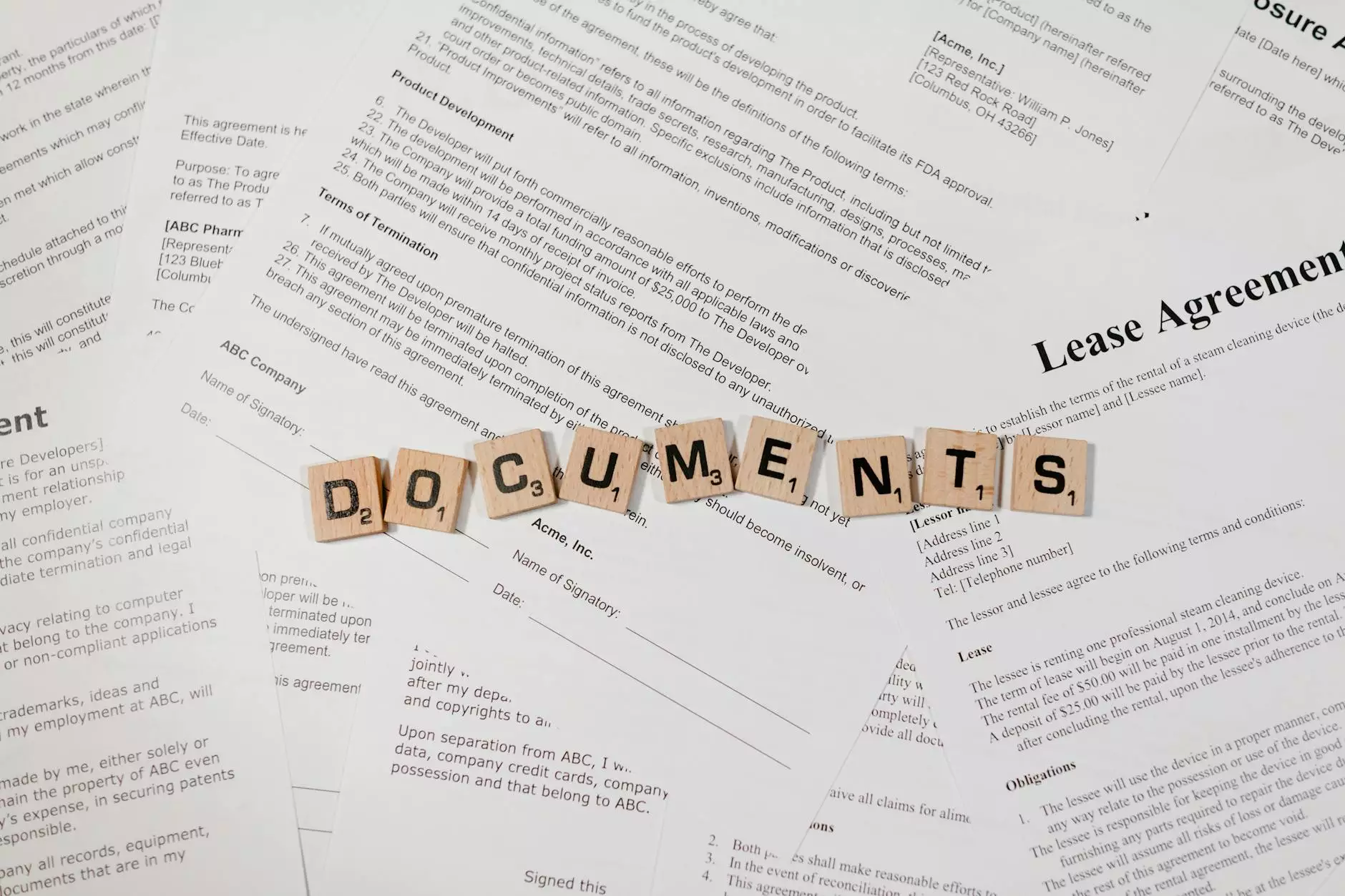What to Look for in a Commercial Lease Agreement

When embarking on a new journey in the world of business, one of the most critical decisions you will make is choosing the right space to operate. The location of your business is pivotal to its success, and the commercial lease agreement you sign is equally significant. This document not only outlines your rights as a tenant but also defines the terms under which you will operate your business for years to come. In this article, we will delve deeply into what to look for in a commercial lease agreement, ensuring that you make an informed choice that positions your business for success.
Understanding Commercial Lease Agreements
A commercial lease agreement is a binding contract between a landlord (lessor) and a business tenant (lessee) that outlines the terms for renting a commercial property. These terms cover everything from lease length, payment structures, to the responsibilities of both parties. Before you sign on the dotted line, it’s paramount to comprehend the nuances within the lease. Below, we break down the essential elements to consider when reviewing a commercial lease agreement.
1. Lease Length and Terms
The length of the lease is perhaps one of the most significant components. Typically, commercial leases may range from one year to as long as twenty years. Here are a few points to consider:
- Lease Duration: Longer leases may provide security and stability, while shorter leases can offer flexibility.
- Renewal Options: Make sure to understand the renewal terms available at the end of the lease period. Look for options that allow for negotiation based on fair market value.
- Termination Clauses: Look for conditions under which either party can terminate the lease early. Understanding penalties or required notices is crucial.
2. Rent and Additional Costs
The financial commitments in your lease agreement extend beyond just the base rent. Consider the following:
- Base Rent: Ensure you know the dollar amount and how often rent increases could occur.
- Operating Expenses: Determine if you are responsible for utility payments, maintenance costs, or property taxes.
- Common Area Maintenance (CAM) Fees: If the property shares common areas, be clear on how these costs are calculated and billed.
- Security Deposit: Understand the total amount and conditions for its return at the end of the lease.
3. Property Use and Zoning Regulations
Before finalizing any lease, ensure that the property is zoned appropriately for your intended use. This could affect everything from renovations to operating hours. Key considerations include:
- Permitted Use Clause: Verify that your business type is allowed in the space. This clause should define what activities you can conduct.
- Zoning Compliance: Check local zoning laws to ensure your business activities are compliant. This can help avoid fines or unexpected restrictions.
4. Rent Escalation Clauses
Many lease agreements include a rent escalation clause that allows the landlord to increase rent at specific intervals. Consider how this might impact your business:
- Fixed Increases: Rent rises at a predetermined rate, providing predictability.
- Market Rent Increases: Rents may increase in response to market conditions, which can significantly affect your expenses.
5. Maintenance and Repairs
Understanding who is responsible for maintenance and repairs is crucial. Carefully review the following aspects:
- Landlord Responsibilities: Typically, landlords are responsible for structural repairs. Ensure you know what these entail.
- Tenant Responsibilities: Clarify what maintenance tasks you are expected to handle. This may include routine repairs and upkeep.
- Modification Rights: If you plan to make alterations to the space, understand the approval process and whether the cost falls to you or the landlord.
6. Insurance Requirements
Most landlords require tenants to carry specific types of insurance. Familiarize yourself with the requirements to ensure compliance:
- General Liability Insurance: Protects against claims of bodily injury or property damage.
- Property Insurance: Coverage for damage to your property within the leased space.
- Business Interruption Insurance: This can protect your income in the event that your business operations are disrupted.
7. Signage and Branding
If you plan to promote your business through signage, it’s essential to address this within your lease agreement:
- Signage Approval: Ensure you can place signage that meets your branding requirements with landlord approval.
- Signage Specifications: Confirm any limitations regarding size, placement, and design.
8. Non-Compete Clauses
Some agreements may include non-compete clauses that restrict your operations in the area or prevent the landlord from renting to similar businesses. Consider:
- Clarity: Ensure the non-compete terms are clear and reasonable. You don’t want to be limited in your market space.
- Geographical Scope: Understand the geographic limitations of the clause. If it’s too broad, it may hinder your business growth.
9. Dispute Resolution
No one enters a lease expecting conflicts, but they can happen. It's wise to understand how disputes will be handled:
- Mediation and Arbitration: Some leases might require mediation before litigation. Understand the process and any associated costs.
- Jurisdiction: Know which laws govern your lease and where legal matters will be handled.
10. Flexibility and Negotiability
Lastly, consider the overall flexibility of the lease. Many terms can be negotiated to better suit your business needs:
- Negotiation Opportunities: Be proactive in discussing terms; many landlords are open to negotiation.
- Customizable Options: Inquire if modifications are possible to suit specific business needs, such as subleasing or expanding the space.
Conclusion
Signing a commercial lease agreement is a pivotal step in establishing your business. By understanding what to look for in a commercial lease agreement, you can protect your investment and ensure a conducive operating environment. Take the time to read and evaluate each term with a fine-tooth comb and consider consulting a real estate attorney to help guide you through the negotiation process.
As you embark on this journey, remember that informed decisions today can lead to lasting success tomorrow. From the initial location search to your final lease signing, it’s crucial to engage proactively in the process. Your future business operations depend significantly on the commercial lease terms you agree upon. Navigate this landscape with awareness, confidence, and the right information at your disposal.









